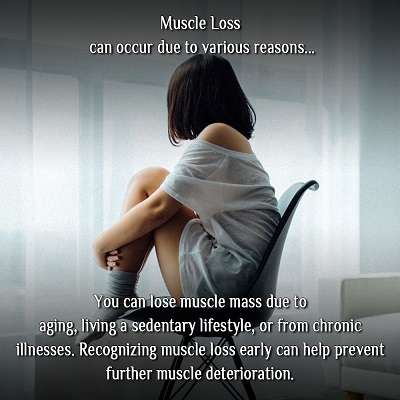 Your body’s muscle mass gives it shape, stability, and balance. Having good muscle mass also provides many health benefits, including improving bone density and giving you more energy.
Your body’s muscle mass gives it shape, stability, and balance. Having good muscle mass also provides many health benefits, including improving bone density and giving you more energy.
Unfortunately, you can lose muscle mass naturally as you age because of the disuse of your muscles over time, or due to neurogenic conditions. Some causes can be reversed through exercise and diet changes, but prevention is always the best and the easiest. That starts with knowing what causes the loss of muscle mass and knowing the signs that there is a problem.
What are the Common Symptoms of Muscle Mass Loss?
If you are losing muscle mass, you might experience the following:
- Weight loss
- Fatigue and weakness
- Fevers, chills, and night sweats
- Loss of sensation
- Diarrhea
- An extreme change in appetite
- Loss of stamina
- Numbness or tingling in arms and legs
- Loss of balance
- Gradual memory loss.
What Causes Muscle Mass Loss?
Losing muscle mass is normal as you age, but if you suddenly experience significant losses or abrupt changes, it might be due to underlying conditions.
Here are some of the causes of muscle mass loss:
Malnutrition
If you are not achieving healthy nutrition it can lead to loss of muscle mass. This is because the body will begin to burn muscle to make the energy and fuel that it needs for the body to function.
Inadequate nutritional intake can lead to insufficient protein in the body, which is essential for building muscles. Insufficient dietary protein intake can cause muscle injury, particularly in the skeletal muscles. Inadequate hydration may also lead to muscle injury because of compromised blood flow to the working muscles.
You have to ensure that you get enough of all the essential nutrients, such as potassium, iron, magnesium, and zinc, all of which play important roles in muscle metabolism and growth.
Poor Lifestyle and Inactivity
Poor lifestyle habits can lead to loss of muscle mass. If you are sedentary, you could lose the muscles that you do not use. As you may have heard, ‘Use it or lose it.’ This is a very true saying, especially in regards to maintaining muscle mass.
If you sit all day in the office and rarely exercise, you can lose muscle mass. Prolonged bed rest may also cause loss of muscle mass. You might have heard of sarcopenia and muscle atrophy, which are mostly seen in inactive people. Inactivity may be elective, or it may be forced upon you due to injury or other factors.
It is important to ensure that you keep your muscles strong. When you exercise, beware of putting too much focus on only one muscle group. This can lead to the under-use and lack of development of other muscle groups.
Mental Health Issues
Muscle mass loss can also be attributed to psychiatric causes related to your emotions, feelings, behaviors, and cognitive processes. For example, if you have mood disorders, such as depression, you may have a loss of appetite. If you have an eating disorder, it can also alter your nutritional intake, which leads to muscle mass loss. Overuse of drugs or substances can also cause weight loss and muscle mass loss.
Hyperthyroidism
Hyperthyroidism is when you have an overactive thyroid, producing excessive hormone thyroxine. This causes metabolic imbalance, unexplained weight loss, and anxiety.
Chronic Diseases or Illness
If you have a chronic disease or systemic illness, you may also experience loss of muscle mass. For instance, advanced cancers can lead to the body breaking down muscles because you need a lot of energy. The same applies to neurologic deficits. These can alter cognition and cause difficulty in movement, leading to malnutrition and weight loss.
Final Thoughts
While it is natural to gradually lose some muscle mass as you age, abrupt losses can very often be prevented. This can be done by leading a healthy lifestyle, which includes a balanced diet and regular exercise.
By taking care of your overall health and well-being, you can help to avoid developing chronic diseases or illnesses. If you experience the symptoms mentioned above, do not hesitate to consult your healthcare provider. They may be due to other underlying conditions, which must be detected as early as possible to mitigate the damage they can cause to your health.






